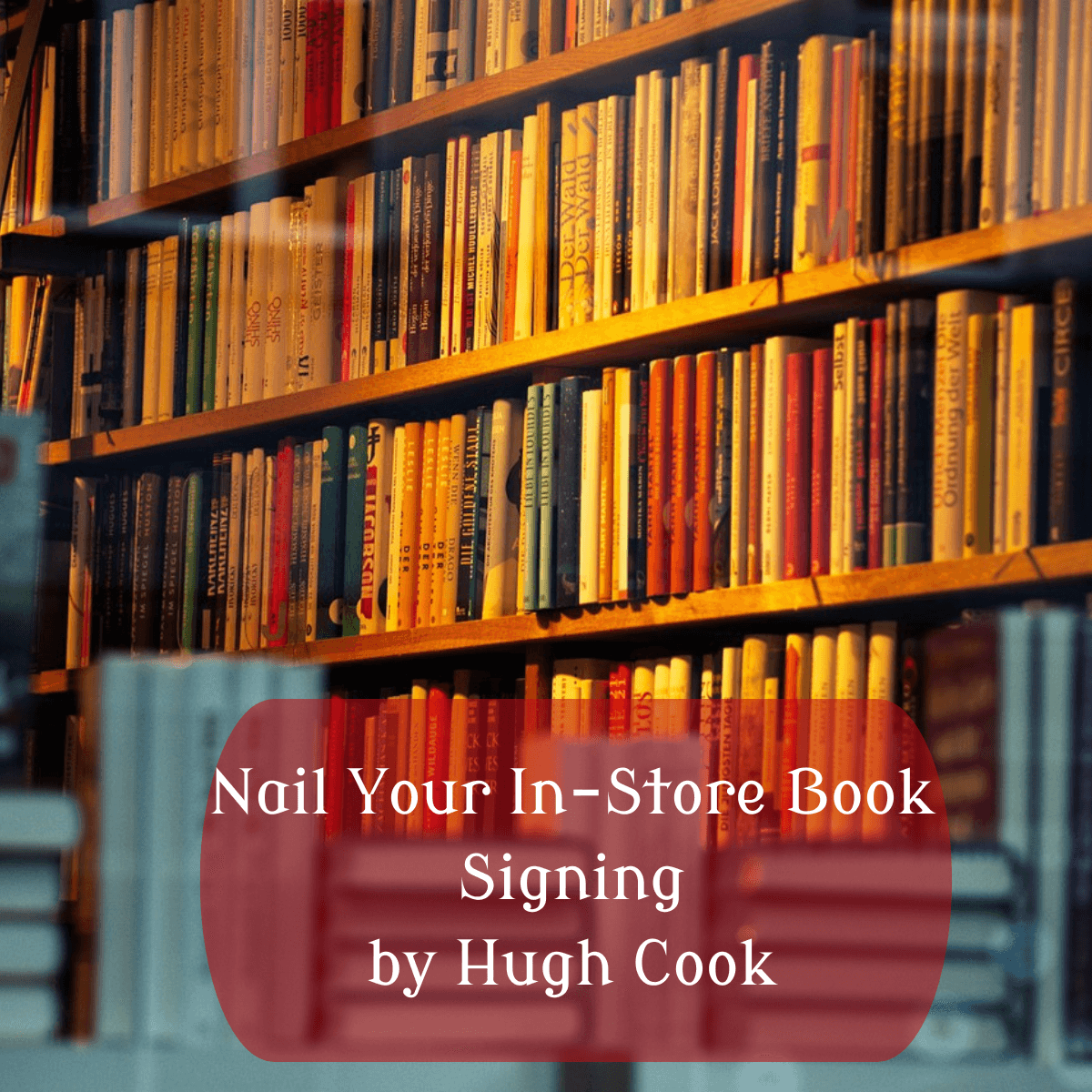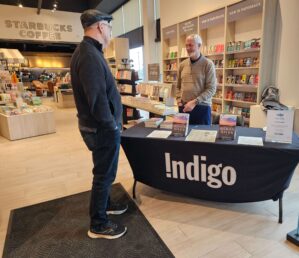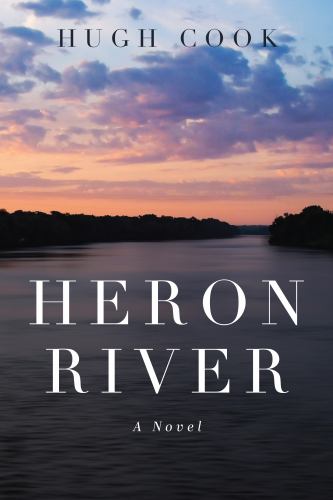by Hugh Cook
On a rainy Saturday morning this spring, Indigo Books, Canada’s largest bookstore chain, arranged an in-store book signing for my novel Heron River. Many of you who read the blogs here on Elizabeth Craig’s site are also writers, and you may be hoping to obtain a bookstore signing yourself for your recently published or soon-to-be-published book. If you land that signing, perhaps some of what I experienced that day at Indigo Books may resonate with you.
The store manager welcomed me as I entered the store and led me to a table just inside the store’s front doors. “Here’s your spot,” he said.
I was worried that with the rain, few people might visit the store that day. Still, I was happy the manager had arranged a spot for me at the store entrance, so that the shoppers who braved the rain that day would have to pass by my table. Had I been placed deep in the store, readers looking for a book on notorious serial killers or how to get rich playing the stock market would have missed my table. So when you land an in-store book signing, see if they can place you at the store entrance, especially if it’s a big-box store like Indigo or Barnes & Noble. The mantra that realtors like to repeat is true also of a book signing: location, location, location.
My advantageous spot in the store would have meant nothing, however, if I’d glued my posterior to the chair behind my table the three hours I was there. You may be a card-carrying introvert, and the thought of getting up off your chair to talk to complete strangers may give you hives, but if you hope to sell books you must get up off your duff. And talk to people.
I tried to think of a snappy ice breaker, something so shoppers walking by would know I was selling a novel, not a book on the basic teachings of Mormonism or a revolutionary new diet that would enable you to lose forty pounds a month. When a woman approached my table, I said, “You’re looking for that gripping novel you can’t put down.”
The woman gave a little snort. “I’m looking for my daughter,” she said, and walked on.
Undeterred, I tried my opening gambit on another shopper. “You’re looking for that gripping novel you can’t put down.”
The woman must have thought I was an employee. “No,” she said, “but can you tell me where the stuffed animals are?”
I tried my spiel a third time. “Actually,” the woman said, “I’m looking for white candles for Easter.”
Oh yes, the store sold more than books. Much more.
I realized my clever line about looking for a gripping novel they couldn’t put down was nothing more than that: merely clever. I would have to change my approach. I told people I was a local author, that the store was featuring a novel I had just published, and that I’d be happy to tell them what it was about. In the next fifteen minutes, two women I talked to said they wanted to support local authors, and bought a copy of my novel. “Bless your heart,” I told them.
I had to engage people, yes, but I also had to be genuine.
Speaking of local, I found it important to tell people my novel is set in nearby Caledonia, a small town on the Grand River fifteen miles away. “I live in Caledonia,” a man said, a smile of surprise lighting his face. I handed him a copy of the novel. He looked it over, recognized the river on the front cover and the old mill on the back, and said those three lovely words, “I’ll buy it.” At your book signing, mention the setting of the novel, wherever that is: Philadelphia, Tuscany, wherever. You might just hit a person who remembers Philadelphia from the movie Rocky, or who had a great vacation last summer in a villa in Tuscany.
The way this man looked the book over, though, front cover and back, riffled through the pages, then bought the book, convinced me I would hand my novel to every person I talked to. Every shopper I handed the book to took their time looking at it, which I figure increased their chances of buying it. If they did not want to buy the book, they would have to hand it back to me.
At this point I need to tell you briefly what the book is about. My novel has two central characters. Adam, a young man of 25, has a developmental disability, the result of his having fallen into a deep well when he was six. Although firefighters pulled him up and he was revived after forty-five minutes of CPR, he was under water long enough to have experienced lack of oxygen to the brain, causing irreversible brain damage. The other central character, Adam’s mother Madeline, blames herself for her son’s fall into the well. She was hanging wash on the clothesline while her two boys played outside, and she feels she should have been more vigilant.
Every writer who has finished a book is told to prepare an elevator pitch, a thirty-second high-concept statement of your novel’s key selling point that compels your listener to want to know more. Now, Heron River, as you can gather from what I’ve just told you about the two main characters, may not appeal initially to those readers who look for a novel that will lift their spirits. And yet, despite the book’s serious subject matter, most audiences are emotionally moved, I find, when I read from the novel’s opening chapter.
So, unable to tell the shoppers at Indigo that my main character marries his college cheerleader sweetheart, they win a ten-million-dollar lottery, and have three beautiful children, I told them the main character of my novel is a 25-year-old young man with a developmental disability after he fell into a well when he was six. Not exactly Oprah, heart-warming stuff.
After about an hour, though, I realized that almost all the people who bought my novel were women, and I decided I would change my elevator pitch. Instead of telling people my main character is a 25-year-old young man with a developmental disability, I told them my main character is a mother whose life takes a tragic turn when her six-year-old boy falls into a well. No one turned away to find a stuffed animal or Easter candles after I said this.
Expect the possibility of surprise. At a book signing, authors not only sign books, but are often asked to inscribe the book to someone. In fact, it’s a question I always ask someone who buys my book: “Would you like me to inscribe it to you?”
That Saturday a young couple came to my table; the mother was carrying a baby. They bought my novel, I signed it, and before I could ask, the mother said, “Could you inscribe it to Isabella?”
“I’d love to,” I said, “that’s you?”
“No, she’s Isabella,” the mother said, and held up her baby.
I had to think for a second. “How old is she?” I asked. I think I must have smiled.
“Fourteen months.”
“You realize this is a novel for adults, right?”
“Uh huh,” the mother said, nodding.
“I guess you’ll be putting it aside for a while then,” I said, and inscribed the book “To Isabella.” Later, I wondered whether this was perhaps the first time they’d met an actual author, and they wanted to commemorate the occasion.
A final suggestion. After Heron River came out, my local city newspaper gave full-page coverage of my novel: a feature story about how I approach writing, and a lengthy review of the book. A full page. Man, most writers I know would give their right arm for such coverage. I took the page along to Indigo, and placed it on the table where shoppers couldn’t miss it. I also printed off a sheet of paper containing the following brief excerpts from newspaper reviews of my novel:
“I had the good fortune of reading Heron River. There isn’t a false note in it.”
“As lovely a novel as I have read in a long time.”
“A beautiful book – a very beautiful book.”
I printed these excerpts in large, 36-point bold font so that even Mr. Magoo would have been able to read them. When you’re selling your novel in a store that has thousands of books—not to mention stuffed animals and Easter candles—you do what it takes. At your book signing, if you’re fortunate to have received reviews of your book, whether they’re from a newspaper, from Amazon, Barnes & Noble, or Goodreads, take along brief excerpts.
I felt good after my three hours in the store, and thought it had gone well. As I was packing up, the manager came over and told me how many books I’d sold. “Impressive,” he said.
I walked out of the store to my car and saw it had stopped raining.
Hugh Cook holds an MFA in fiction writing from the Writers’ Workshop at the University of Iowa. He has published two books of short stories and two novels. Readers can obtain his recent novel Heron River at Amazon and at Barnes and Noble . Send him a query at hughcook212@gmail.com.
Nail Your In-Store Book Signing by @HughCook_ca : Share on X
Image by wal_172619 from Pixabay





Great post, Hugh, and reminiscent in some ways of my last bookstore signing in terms of the lady looking for candles. I love your tip about having review quotes in a huge font. Thanks for the article!
Thanks, Elizabeth. What I said about the importance of reaching out and speaking to potential buyers of your book also holds true for obtaining reviews of your book: you have to work at it.
These are really good suggestions, for which thanks. People's impressions of an author often depend on those in-person events, and you don't get a lot of chance to really interact. So it's so important to know how to make it work in person. And I think people's view of the author impacts their interest in the books, too.
Thanks, Margot. Well said.
Thanks for sharing your experiences at book signings, Hugh. I'm not sure I could get up and start talking to people like you did. But it sounds like a great approach.
Thanks, Natalie. Reaching out to strangers may seem daunting at first, especially if you're not naturally outgoing, but making the effort usually brings rewards.
From day one, I never sat. I actually roamed a lot with my bookmarks and a book, handing them to anyone who showed interest. And my husband is a pro and engaging people when we do comic cons. Usually he'll comment on their shirt and a few minutes later, they are buying a book.
Lovely. That’s the spirit!